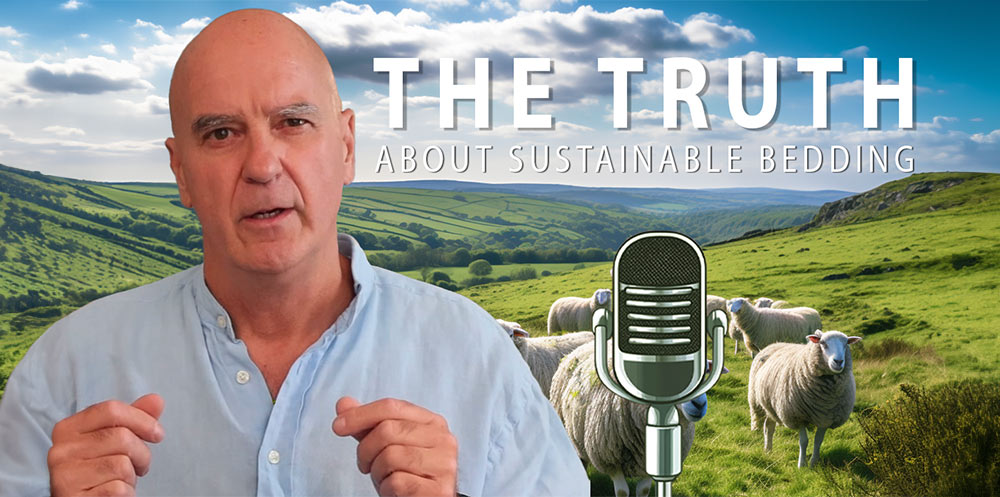Why Wool Matters: The truth about sustainable bedding and the hidden costs of synthetics

Let’s take a moment to talk about something very close to my heart, the role of wool in sustainable bedding - and why the choices we make matter, not only for our own homes, but also for the environment around us.
At Devon Duvets, wool (especially British wool) is a material we hold in the highest regard, and there’s a reason for that. Wool has been a cornerstone of British farming for centuries, a natural, renewable resource that is deeply connected to our heritage and landscape.
But in recent decades, synthetic fibres have gained popularity, and the consequences of this shift are worth considering for the impact they make.
The Rise of Synthetics
In the 1980s, synthetic fibres began to dominate, marketed as a convenient, modern alternative to natural materials like wool.
While this may have seemed appealing, what wasn’t well understood at the time was the environmental impact of these materials. Synthetic fibres are derived from petroleum-based products, resulting in a manufacturing process with a high carbon footprint. Unlike wool, which is biodegradable and naturally enriches the soil, synthetic fibres can take hundreds, even thousands, of years to break down.
Furthermore, synthetic products release microplastics into our waterways every time they are washed. These microplastics cause immense harm to marine ecosystems. Wool, by contrast, sheds no harmful particles and decomposes naturally, making it the far better choice for those of us concerned about our planet.
Visualising the Impact
If you’re reading this and have a few moments, do listen to our recent podcast, Why Wool Matters: The Truth About Sustainable Bedding and the Hidden Costs of Synthetics, where I explore these issues in more depth. In the podcast, I share a visual comparison showing the environmental impact of wool versus synthetic fibres over the past 40 years.
Wool remains a sustainable option, while the environmental burden of synthetic fibres continues to rise. It really is quite an eye-opener when you see the data laid out.
In the podcast, I also highlight the decline of UK sheep farming over the same period. Back in 1974, there were around 90,000 sheep farmers across the UK. Today, that number has halved to approximately 45,000.
This decline isn’t just a statistic – it represents a loss of our heritage, tradition, knowledge, and an important way of life that has shaped our countryside for centuries. The rise of synthetics and the undervaluing of wool play a significant role in this trend.
Supporting Sustainable Choices
At Devon Duvets, we have always been committed to supporting British sheep farmers by using the finest quality, ethically sourced wool, which is certified as Traceable British Wool.
We never chemically treat our wool because we believe in keeping it as natural as possible. While treated wool might be marketed as more “convenient” or “easy care,” do you really want to sleep under a product that’s been altered with chemicals?
We think not. Our British wool products offer comfort, quality, and peace of mind – naturally – and each one is individually handcrafted by our seamstresses in our Devon based workshop.
It’s also important to remember that not all wool is the same. Cheaper grades may lack the inherent qualities that make wool such a fantastic material for bedding, but at Devon Duvets, we only work with the highest quality, sustainable wool that doesn’t need chemical intervention and has a softness and springiness that makes it perfect for a natural night’s sleep.
A Thought for the Future
So, next time you’re considering new bedding or even a warm jumper, think about the material it’s made from. Think about the story behind it – the farmers, the sheep, and the land.
By choosing British wool, you’re not only getting a product that’s better for you and your family, but you’re also supporting a more sustainable future. A future that values quality, tradition, and the environment over convenience and short-term gain.
I invite you to listen to our podcast to delve deeper into these topics. Let’s keep championing the incredible benefits of wool and, in doing so, support our hardworking farmers and environment that make it all possible.
Until next time, sleep well and take care.
Written by Dick Beijen
Owner, Devon Duvets


